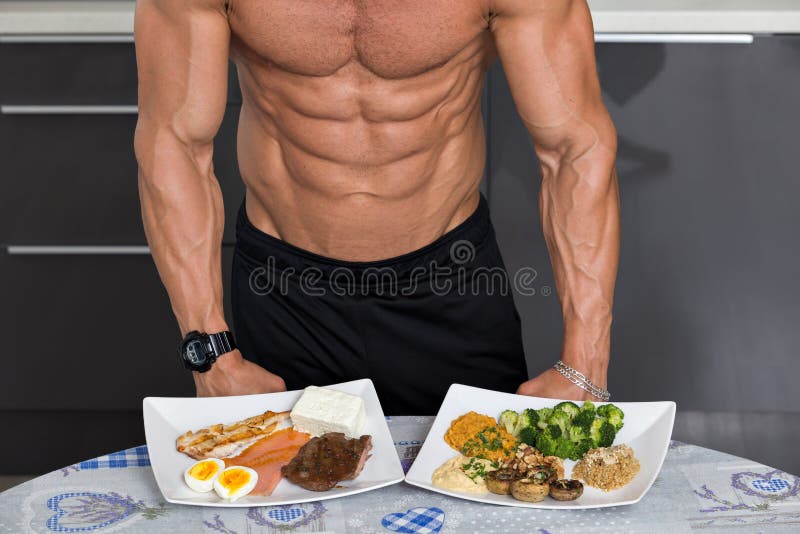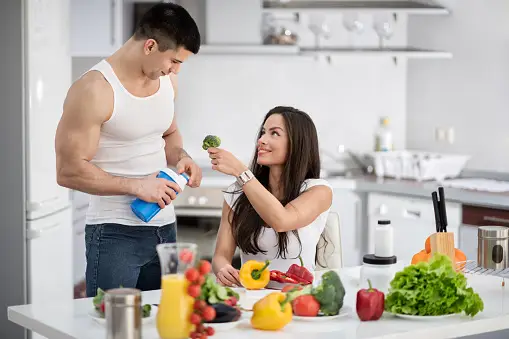In recent years, there has been a significant rise in the popularity of veganism and bodybuilding. While many people believe that these two lifestyles are incompatible, the truth is that they can be successfully combined to create a vegan bodybuilding diet plan.
This plan focuses on building muscle mass and strength while following a plant-based diet that excludes animal products. With the right balance of protein, carbohydrates, and healthy fats, vegan bodybuilders can achieve their fitness goals and enjoy the benefits of a vegan lifestyle.
In this blog, we will explore the 10-day vegan bodybuilding diet plan, the foods to eat and avoid, and the benefits of this approach to nutrition and fitness.
What is Vegan Bodybuilding diet?
A vegan bodybuilding diet is a way of eating that emphasizes plant-based foods for muscle growth, strength, and overall health. The diet is designed to provide enough protein for muscle growth and recovery, with a focus on plant-based proteins that offer essential amino acids. By consuming a wide variety of plant-based foods, vegan bodybuilders can meet their nutritional needs and support their athletic performance.
Nutrition is essential for muscular growth. Protein consumption should be roughly 0.7-1.0 grams per pound (1.6-2.2 grams per kilogram) of body weight per day to promote optimal muscle building.
A calorie surplus of 10-20% is also advantageous for muscle building, particularly for people who are not new to training.
Unlike traditional bodybuilding diets that rely heavily on animal products, a vegan bodybuilding diet excludes meat, dairy, and other animal-derived foods. Instead, it relies on plant-based sources of protein such as legumes (like black beans and lentils), tofu, quinoa, and tempeh. These vegan protein sources are not only rich in protein but also contain important nutrients like fiber, vitamins, and minerals that are essential for overall health.
Benefits of vegan bodybuilding diet
Following a vegan bodybuilding diet can offer a range of benefits for both muscle growth and general health. Here are some of the key advantages of adopting this dietary approach:
Reduces the risk of heart disease
People who follow vegan diets appear to have a much lower risk of acquiring cardiovascular disease.
This could be ascribed in part to a lower intake of saturated fats and cholesterol, as well as an increase in fiber and other plant substances. Traditionally, vegans had lower blood pressure and levels of total and LDL (bad) cholesterol than the general public.
Furthermore, the vegan bodybuilding diet is rich in fruits and vegetables, which include a lot of nutritional fiber. High fiber consumption has been linked to a lower risk of stroke and heart disease.
Promotes a healthy body weight
Vegans tend to have a lower body mass index (BMI) than individuals who eat a regular Western diet, which lowers their risk of various diseases.
One 16-week study examined the impact of a vegan diet on 75 overweight persons. It discovered that the vegan diet outperformed the control diet in terms of body weight, fat mass, and insulin resistance markers.
As a result, if you’re just starting out in bodybuilding and need to reduce some weight, the vegan diet could help.
May protect against some malignancies
Following a vegan diet has been linked to a lower risk of many types of cancer when compared to a standard Western diet.
This benefit is most likely due to the vegan diet’s greater intake of legumes, fruits, and vegetables, which results in higher fiber, micronutrient, and phytonutrient intakes.
The vegan diet has also been linked to a lower BMI. A high BMI is an additional risk factor for certain types of cancer.

Food To Eat in Vegan Bodybuilding Diet
When following a vegan bodybuilding diet, it’s important to choose foods that are packed with essential nutrients, protein, and healthy fats. Here are some of the foods that should be included in a vegan bodybuilding diet plan:
- Chia seeds: Chia seeds are a great source of protein, healthy fats, and fiber. They can be added to smoothies, oatmeal, or used as an egg substitute in baking recipes.
- Brown rice: Brown rice is a staple in many vegan bodybuilding diets, as it is a good source of complex carbohydrates for energy, and also contains some protein.
- Black beans: Black beans are a versatile legume that is high in protein and fiber, making them an excellent addition to a vegan bodybuilding diet. They can be used in salads, soups, or as a filling for burritos and tacos.
- Soy milk: Soy milk is a popular alternative to dairy milk, and it is often fortified with essential nutrients like calcium and vitamin D. It is also a good source of protein, making it a suitable choice for vegan bodybuilders.
- Hemp seeds: Hemp seeds are a complete protein source, meaning they contain all essential amino acids. They are also rich in omega-3 fatty acids, which are important for overall health.
- Quinoa: Quinoa is a nutrient-dense grain that is high in protein, fiber, and essential amino acids. It can be used as a base for salads, added to stir-fries, or used as a replacement for rice in many recipes.
- Leafy greens: Leafy greens such as spinach, kale, and Swiss chard are packed with important vitamins and minerals, including iron and calcium. They can be eaten raw in salads, sautéed as a side dish, or blended into smoothies for an extra nutritional boost.
- Nutritional yeast: Nutritional yeast is a deactivated yeast that adds a cheesy nutty flavor to dishes. It is often used as a topping for popcorn, pasta, or roasted vegetables. It is also a good source of protein, B-vitamins, and minerals.

Foods to avoid in Vegan Bodybuilding Diet
- Meat
- Dairy products
- Eggs
- Honey
- Gelatin
- Whey protein
- Casein
- Collagen supplements
10-Day vegan bodybuilding diet plan
Day 1:
- Breakfast: Oatmeal topped with berries
- Lunch: Quinoa salad with mixed veggies
- Dinner: Tofu stir-fry with brown rice
Day 2:
- Breakfast: Chia pudding with almond milk
- Lunch: Lentil soup with whole grain bread
- Dinner: Vegan chili with black beans and quinoa
Day 3:
- Breakfast: Green smoothie with spinach, banana, and hemp seeds
- Lunch: Chickpea salad with mixed greens
- Dinner: Stuffed bell peppers with lentils and quinoa
Day 4:
- Breakfast: Avocado toast on whole grain bread
- Lunch: Black bean burrito bowl with brown rice
- Dinner: Tofu curry with veggies and quinoa
Day 5:
- Breakfast: Acai bowl topped with granola and berries
- Lunch: Tempeh sandwich with whole grain bread
- Dinner: Vegetable stir-fry with tofu and brown rice
Day 6:
- Breakfast: Vegan protein pancakes topped with almond butter and berries
- Lunch: Mixed bean salad with leafy greens
- Dinner: Eggplant lasagna with tofu ricotta
Day 7:
- Breakfast: Vegan yogurt with granola and berries
- Lunch: Portobello mushroom burger with sweet potato fries
- Dinner: Lentil stew with veggies
Day 8:
- Breakfast: Green smoothie with kale, spinach, and hemp seeds
- Lunch: Quinoa tabbouleh with chickpeas
- Dinner: Tofu kebabs with roasted veggies
Day 9:
- Breakfast: Overnight oats with almond milk and chia seeds
- Lunch: Spinach and kale salad with lentils
- Dinner: Seitan stir-fry with veggies and brown rice
Day 10:
- Breakfast: Protein-packed tofu scramble with veggies
- Lunch: Vegan protein bowl with quinoa, black beans, and avocado
- Dinner: Zucchini noodles with marinara sauce, topped with nutritional yeast
Remember to stay hydrated throughout the day by drinking plenty of water or unsweetened herbal tea. Snacks such as fruits, almonds, or vegan protein bars can be added as needed.

Frequently Asked Questions
Why is Arnold Schwarzenegger vegan?
Arnold Schwarzenegger, a renowned bodybuilder and actor, has transitioned to a vegan diet for health and environmental reasons. He has emphasized the health benefits of a plant-based diet, stating that it helps him maintain energy levels, improves his digestion, and reduces inflammation in the body. Schwarzenegger has also expressed concerns about animal agriculture’s impact on climate change and advocates for more sustainable food choices. While he follows a vegan diet, he still emphasizes the need for a balanced approach and prioritizes getting enough protein and nutrients for muscle building.
What do vegan bodybuilders eat?
Vegan bodybuilders focus on consuming a variety of plant-based foods that provide the nutrients needed to support muscle growth and overall health. Here are some foods commonly included in a vegan bodybuilder’s diet:
- Plant-based protein sources like tofu, tempeh, legumes, and seitan
- Awide range of fruits and vegetables for fiber, vitamins, and minerals
- Healthy fats from nuts, seeds, avocado, and nut butter
- Whole grains such as quinoa, brown rice, and oats
- Vegan protein powders for convenient protein supplementation
Can you build muscle on a vegan diet?
Yes, it is absolutely possible to build muscle on a vegan diet. Plant-based protein sources such as tofu, tempeh, legumes, and quinoa can provide all the essential amino acids needed for muscle growth and recovery. It’s important to ensure an adequate intake of protein, enough calories to support muscle growth, and a balanced diet that includes sufficient carbohydrates and healthy fats. Vegan bodybuilders can meet their protein needs through a combination of whole foods and vegan protein powders, as well as careful meal planning to ensure they are getting enough amino acids from various plant sources.
What is a 60 20-20 macro for vegans?
The 60-20-20 macronutrient ratio is a dietary guideline that suggests consuming 60% of calories from carbohydrates, 20% from fat, and 20% from protein. However, it’s important to note that these percentages are general recommendations and may vary based on individual needs, goals, and preferences.
Let’s Sum Up
To sum it up, a vegan bodybuilding diet can provide all the necessary nutrients for muscle growth and overall health while aligning with ethical and environmental values. By following a well-planned vegan bodybuilding diet, you can meet your protein, carbohydrate, and fat needs from plant-based sources.
With dedication, consistency, and proper training, you can achieve your bodybuilding goals on a vegan diet. Consult a nutritionist or dietitian for personalized guidance and optimization of your vegan bodybuilding diet.



